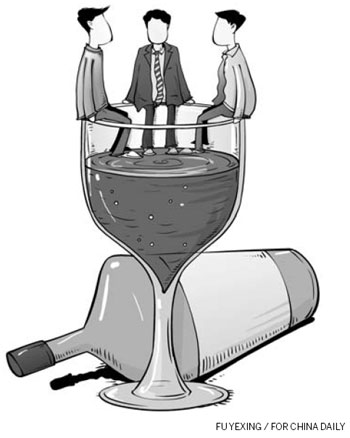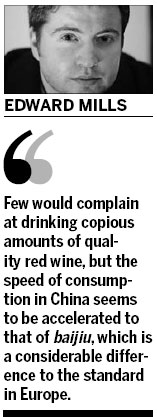

As popular as drinking baijiu will always be, the ganbei culture of traditional Chinese drinking is not without its victims. Only a few months ago, an official in Hubei province died from an alcohol-induced heart attack.
An anonymous official in Shandong province at the time stated that, "We would lose face if we could not get our guests drunk. ... Neither my guests nor I want to get drunk but we have to play under the unspoken rule, which has been around for so long. We don't know how to do business otherwise."
Whilst ganbei culture might be the more headline-grabbing traditional phenomenon, there is change underfoot that certainly merits a mention.
One feels that the differences between European-style and Chinese drinking habits have been steadily eroding over recent years. Bars serving cheap beer and dodgy spirits are not a new occurrence, but there certainly has been a noticeable emergence of wine as a realistic and enjoyable option for drinkers and diners alike.
Trendy wine bars, previously frequented exclusively by tourists and expats, are now counting Chinese citizens as their loyal customers, where the numbers of these bars have been growing consistently over the past few years.
As a wine connoisseur, you wouldn't be too unimpressed with the selection available to you these days, despite the significantly elevated price of more common brand wine that might get up your nose.
Even very local restaurants are beginning to catch onto the trend, with Chinese produced Cabernet Sauvignon, or the questionably labeled "red wine" of no particular grape and dubious quality, happily sitting on the menu alongside the list of baijiu.

The style of drinking red wine, however, can often fall back on the customs associated with ganbei culture. Few would complain at drinking copious amounts of quality red wine, but the speed of consumption in China seems to be accelerated to that of baijiu, which is a considerable difference to the standard in Europe.
Set aside the reports of a drunken underclass roaming city centers at night that largely emanate from Britain, however much truth there may be in it: European wine drinkers are of different stock.
It is usual to drink wine with dinner, but steadily sipping from your glass across the course of the evening at an independent pace. Refilling of one's glass is also not necessarily linked to others sharing the meal and turning it down is not considered an affront to the host's standing.
Summer outdoor relaxation with a glass in hand, as the sun goes down and the night draws in, also registers as a utopian moment in many European drinkers' minds in a way that seems contrary to the Chinese mentality. Drinking here rarely seems to continue beyond dinner for the overwhelming number of Chinese.
Many local red wine drinkers still treat it like baijiu, filling a glass to the top to down it in celebration with their opposite number. Whether that will continue as red wine becomes more popular, or whether the European standard will be applied is something to look out for.
Price is an issue impacting on the growth of wine consumption too, as a low quality wine will still massively outstrip the price of a middling bottle of baijiu.
Nonetheless, adjusting for the immaturity of the Chinese wine market, it is still possible to seek out something appealing for just shy of 100 yuan, if you know where to look.
Regardless of individual views on drinking etiquette and the differences associated with it, good wine on the rise in China can only be seen as a good thing from a personal perspective, despite the price.
As Jean Anthelme Brillat-Savarin, a French gastronome, is said to have stated, "A meal without wine is like a day without sunshine."
In today's Beijing, the sun is shining. Cheers.